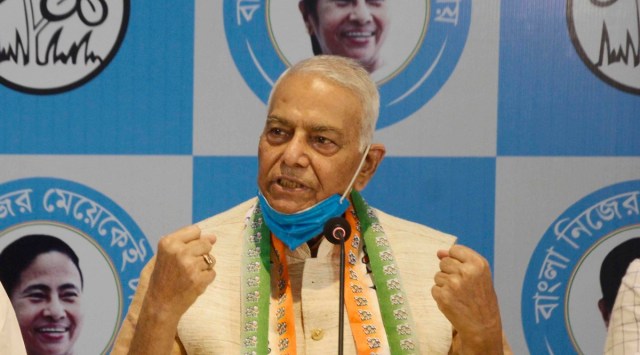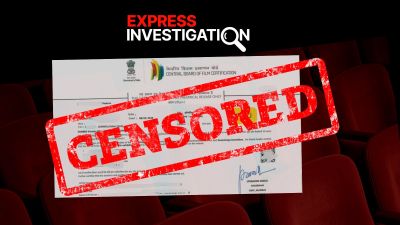Govt backing for Kashmir Files imperilled Pandit lives, says Yashwant Sinha panel
The group’s report, based on its visit to Jammu and Kashmir, also claims residents of Jammu have not accepted the downgrading of the state to a Union Territory and resent the domicile policy change.
 Yashwant Sinha (Express photo)
Yashwant Sinha (Express photo)The Concerned Citizens’ Group—a civil society group led by former finance minister Yashwant Sinha—has said the official promotion of the film Kashmir Files evoked strong sentiments in the Kashmir valley and made the lives of the remaining Pandits “unsafe”.
“After the official promotion of the film The Kashmir Files, not only had the remaining Kashmiri Pandits become unsafe in the Valley, even mainstream politicians feared for their lives. …Civil society groups conveyed to us that the film—more ‘reelty’ than ‘reality’, as a leading academic put it—seeks to slander, vilify and delegitimise the Valley’s majority community’s own pain and suffering of three decades during which period tens of thousands of youths were killed,” the tenth report of the group, prepared after visit to Kashmir, said.
“Every family lost a member and has a story to tell. All Kashmiris have suffered and all need justice. But The Kashmir Files, in a brutal and dehumanising manner—people averred—describes every Kashmiri Muslim as barbaric, devious and jihadi to boot. This at a time when hotels in Kashmir are chock-a-block full of tourists from the rest of India!” it added.
The release of the film has coincided with increasing attacks on outsiders and Kashmiri Pandits in the Valley.
Apart from Sinha, the group has four members—Sushobha Barve (executive secretary, Centre for Dialogue and Reconciliation, Delhi), Wajahat Habibullah (former chairman of the National Minorities Commission and the first chief information commissioner of India), Air Vice Marshal (Retd) Kapil Kak and Bharat Bhushan, a former editor and independent journalist. Sinha, however, did not visit the Valley for the report.
According to the report, the mood has worsened in the Valley since the abrogation of Article 370.
“A political leader claimed that as long as Delhi pressed only political buttons–removing the provisions of Articles 370 and 35A, bifurcating the state, fiddling with the delimitation of constituencies–Kashmiris would do nothing. ‘They will do nothing even if there were a Hindu chief minister from Jammu. …If, however, the Centre presses religious buttons – interfering with prayers in mosques, banning hijab for women or anything that seems to be preventing religious practices – then Kashmir will erupt,’ he claimed,” the report said.
“A significant fact that the group noticed this time around was that Kashmiris across the board thought that communal hatred had gone very deep,” the report added.
According to the report, a common perception in the Valley was that militancy would continue–not so much with militants being sent across by Pakistan but with local recruitment. “There is a palpable distancing from India amongst the youth,” the report said.
The group found that the political ambience in Srinagar was much more mistrustful and tense than during its earlier visits.
“The political leaders…thought that the delimitation proposed…was tendentious and was aimed at polarisation of communities. They pointed out that the commission’s proposals upheld the principles of neither the population size, which would have given more constituencies to Kashmir division, nor accessibility, which would have favoured the outlying mountainous areas (referred to as Trans-Chenab) of Jammu, although these were both the recognised determining principles in aligning constituencies adopted by delimitation commissions at the national level,” it said.
The report claimed that politicians felt the delimitation exercise had created communal division as well as anxiety by virtually pitching Jammu against Kashmir.
“Many in Jammu allege that the delimitation commission report was prepared in the BJP office in Jammu and then stamped by the commission. Jammuites have not accepted the downgrading of the erstwhile J&K state to a Union Territory. This remains an overwhelming sentiment across all communities and professional groups across the region,” the report said.
Politicians in Kashmir, the report claimed, apprehended that the Centre was trying to break the Peoples’ Alliance for Gupkar Declaration. “‘We managed to stay together for the District Development Council elections. But today the situation is quite different and at this rate we may not be able to manage to keep the alliance intact for the assembly elections,’” a politician was quoted as saying by the report. There was high expectation that the Assembly elections would be held sooner than later, it added.
The report opined that the media was under increasing pressure in Kashmir.
“The general impression we gathered was that the role that free media could play in J&K to hold the administration to account had been diminished with media increasingly put on a tight leash,” the report said.
“There was a sense of fear amongst media practitioners. …The coercive environment, they claimed, consisted of intense surveillance, preparing background notes on all journalists (listing their names, siblings, parents, bank account details and properties owned), asking journalists to specify their political ideology and their stand on various issues, abolition of the Kashmir Press Club to prevent interaction amongst journalists, monitoring of social media activity, not renewing accreditation cards and not recognizing “freelance” journalists,” it added.
According to the report, journalists claimed they were pressured not to give the version of the family members of those shot in encounters with the security forces. They were criminalised if they questioned the police version of the events and accused of purveying “fake news” or “working to an agenda”.
On Jammu, the report said that the full impact of the abrogation of Article 35A began to be felt following the change in the domicile policy that opened the doors to residents from outside Jammu and Kashmir to acquire jobs, land purchase, mining rights, liquor shops, etc.
“These policies have been unpopular with the Jammuites. …It seems that in the Jammu region, besides the anger over loss of statehood, various social and ethnic groups and communities—including lawyers, traders, industrialists, Jammu Muslims, Paharis and Gujjars—are also resentful because of the various issues affecting them. However, there is no political party or a political leader articulating their anger to mobilise people politically,” it said.







